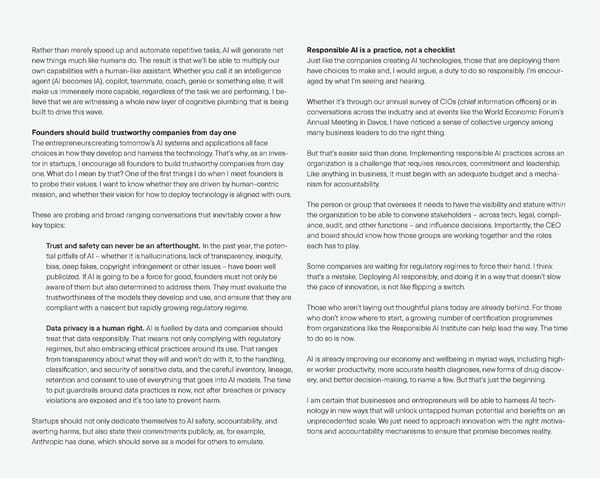Responsible AI is a practice, not a checklist Rather than merely speed up and automate repetitive tasks, AI will generate net new things much like humans do. The result is that we'II be able to multiply our Just like the companies creating AI technologies, those that are deploying them have choices to make and, 1 would argue, a duty to do so responsibly. l'm encour own capabilities with a human-like assistant. Whether you call it an intelligence agent (AI becomes IA), copilot, teammate, coach, genie or something else, it will aged by what l'm seeing and hearing. make us immensely more capable, regardless of the task we are performing. 1 be lieve that we are witnessing a whole new layer of cognitive plumbing that is being Whether it's through our annual survey of CIOs (chief information o昀케cers) or in built to drive this wave. conversations across the industry and at events like the World Economic Forum's Annual Meeting in Davas, 1 have noticed a sense of collective urgency among many business leaders to do the right thing. Founders should build trustworthy companies from day one The entrepreneurs creating tomorrow's AI systems and applications all face choices in how they develop and harness the technology. That's why, as an inves But that's easier said than dane. lmplementing responsible AI practices across an organization is a challenge that requires resources, commitment and leadership. tor in startups, 1 encourage all founders to build trustworthy companies from day one. What do I mean by that? One of the 昀椀rst things I do when I meet founders is Like anything in business, it must begin with an adequate budget and a mecha to probe their values. 1 want to know whether they are driven by human-centric nism for accountability. mission, and whether their vision for how to deploy technology is aligned with ours. The person or group that oversees it needs to have the visibility and stature within the organization to be able to convene stakeholders - across tech, legal, compli These are probing and broad ranging conversations that inevitably cover a few ance, audit, and other functions - and in昀氀uence decisions. lmportantly, the CEO keytopics: and board should know how those groups are working together and the roles each has to play. Trust and safety can never be an afterthought. ln the past year, the poten tial pitfalls of AI - whether it is hallucinations, lack of transparency, inequity, Some companies are waiting for regulatory regimes to force their hand. 1 think bias, deep fakes, copyright infringement or other issues - have been well publicized. lf AI is going to be a force for good, founders must not only be that's a mistake. Deploying AI responsibly, and doing it in a way that doesn't slow the pace of innovation, is not like flipping a switch. aware of them but also determined to address them. They must evaluate the trustworthiness of the models they develop and use, and ensure that they are Those who aren't laying out thoughtful plans today are already behind. For those compliant with a nascent but rapidly growing regulatory regime. who don't know where to start, a growing number of certi昀椀cation programmes Data privacy is a human right. AI is fuelled by data and companies should from organizations like the Responsible AI lnstitute can help lead the way. The time to do so is now. treat that data responsibly. That means not only complying with regulatory regimes, but also embracing ethical practices around its use. That ranges AI is already improving our economy and wellbeing in myriad ways, including high from transparency about what they will and won't do with it, to the handling, classi昀椀cation, and security of sensitive data, and the careful inventory, lineage, er worker productivity, more accurate health diagnoses, new forms of drug discov ery, and better decision-making, to name a few. But that's just the beginning. retention and consent to use of everything that goes into AI models. The time to put guardrails around data practices is now, not after breaches or privacy violations are exposed and it's too late to prevent harm. 1 am certain that businesses and entrepreneurs will be able to harness AI tech nology in new ways that will unlock untapped human potential and bene昀椀ts on an Startups should not only dedicate themselves to AI safety, accountability, and unprecedented scale. We just need to approach innovation with the right motiva tions and accountability mechanisms to ensure that promise becomes reality. averting harms, but also state their commitments publicly, as, for example, Anthropic has dane, which should serve as a model for others to emulate.
 AI: A 100x Force Transforming Our Lives Page 11 Page 13
AI: A 100x Force Transforming Our Lives Page 11 Page 13